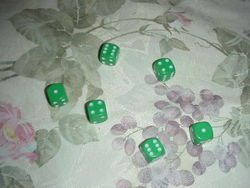 a family dice game
a family dice game
6-Dice, 10,000 Dice (or "Dice_10000") is the name of a family dice game, very similar to Farkel.
Contents |
Equipment
- six dice
- sheet of paper for keeping score
Play
- Everyone starts out "off the table." Each player collects points during his turn, which he may add to his total, or not, depending on how aggressively or cautiously he plays.
- To begin a turn, if the player is "off the table,"
he rolls all six dice.
- As he rolls during his turn, the player is looking to score points, in the form of Sets (see figure below).
- If a roll scores any points, he may set aside
each Set he wants to claim points from, and either:
- roll all remaining dice, hoping to score additional Sets.
- or if all six dice are put aside into Sets, roll all six dice again, hoping to score additional Sets.
- or pass play to the next player, if he deems the chance of failure to be too great.
- If a roll scores no points, the player forfeits the points scored that turn, and play is passed to the next player.
- For a player who is "on the table," he may start by
either:
- rolling all six dice as described above,
- or picking up the rollable dice from the last person. In this case, instead of starting this turn's scoring from zero, as usual, scoring starts from the score of the last person.
example: Player 1 stops his turn with 700 points, and opts to not roll his remaining two dice. He adds 700 to his score, and it is now Player 2's turn. Player 2 may pick up those two dice, and if he scores anything with them, he adds those points to 700, as his score. Or Player 2 may opt to start with all six dice, and start his own scoring from zero. (Note: In one variation of the game, players do not have the option to continue the previous player's turn.)
- At the end of a turn,
- If, after rolling, a player is "off the table," and he has scored at least 1000 in a turn, he is "on the table."
- If by this point, a player is "on the table," he can add whatever score he got that turn, to his total.
Scoring and Sets
The following Sets are given for scoring. You cannot put sets together, as you are expected to in Yahtzee or Farkle. If you set aside a triple of 5's, then rolled a single 5, you could not claim a four-of-a-kind. You could merely claim one triple of 5's, and one single 5. Your score would be 500 + 50 = 550. When rolling 4 or greater of a kind, each additional kind that is matched doubles your score. So if you rolled five 4's, your score would be 400 for the first 3. Then double that for the fourth, making it 800, then double again to make it 1600 points. 400x2x2 = 1600.
a single 1 : 100 a single 5 : 50 triple of 1's : 1000 triple of 2's : 200 triple of 3's : 300 triple of 4's : 400 triple of 5's : 500 triple of 6's : 600 four-of-a-kind : Multiply triple score by 2 five-of-a-kind : Multiply four-of-a-kind score by 2 six-of-a-kind : Multiply five-of-a-kind score by 2 six of 1's : Instant Win three pair : 750 straight (length 6) : 750
An alternative scoring set, using the above but with the following changes.
3 pairs (boxcar): 750 - This set may be built over what you set aside and may replace any current score from the dice.
Winning
A typical game is played for about 20-30 minutes with a player needing to reach 10,000 points.
When the first player crosses that threshold, all other players get one more chance to top that player's score. If a player can, then that player wins. Otherwise, the first player to cross that threshold is the winner.
Categories: Dice games




 216.73.216.133
216.73.216.133 User Stats:
User Stats:
 Today: 0
Today: 0 Yesterday: 0
Yesterday: 0 This Month: 0
This Month: 0 This Year: 0
This Year: 0 Total Users: 117
Total Users: 117 New Members:
New Members:
 216.73.xxx.xxx
216.73.xxx.xxx
 Server Time:
Server Time: